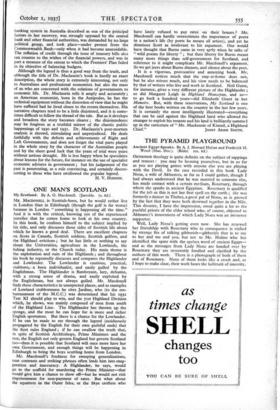ONE MAN'S SCOTLAND
My Scotland. By A. G. Macdonell. (Jarrolds. 7s. 6d.)
MR. MACDONELL is Scottish-born, but he would rather live in London than in Edinburgh (though the golf is far worse) because in London " something is happening all the time." And it is with the critical, knowing eye of the experienced traveller that he comes home to look at his own country. In this book, he confines himself to the subject implied by his title, and only discusses those sides of Scottish life about which he knows a good • deal. There are excellent chapters on Scots in Canada, Scottish soldiers, Scottish golfers, and the Highland evictions ; but he has little or nothing to say about the Universities; agriculture in the Lowlands, the fishing industry, or the Church today. His main theme is the exploitation and ruin of the Highlands ; and throughout his book he repeatedly discusses and compares the Highlander and Lowlander. The Lowlander is cautious, practical, stubborn,• a keen individualist, and easily gulled by the Englishman. The Highlander is flamboyant, lazy, defeatist, with a strong sense of drama, and easily exploited by the Englishman, but not always gulled. Mr. Macdonell finds these characteristics in unexpected places, and as examples of Lowland stubbornness he cites Jardine, who (to the em- barrassment of the M.C.C.) was determined that his 1932 Test XI should play to win, and the 51st Highland Division which, he shows, was mainly composed of men from south of the Highland Line. The Highlander has thrown up the sponge, and the most he can hope for is • more and richer English sportsmen. But there is a chance for the Lowlander. If he can be made to see through the legend (assiduously propagated by the English for their own guileful ends) that the Scot rules England ; if he can swallow the truth that, in spite of Scottish Archbishops, Prime Ministers and the rest, the English not only govern England but govern Scotland too—then it is possible that Scotland will once more have her own Government, and enough things will be happening in Edinburgh to bring the boys scuttling home from London.
Mr. Macdonell's fondness for sweeping generalisations, neat contrasts and striking phrases often leads him into exag- geration and inaccuracy. A Highlander, he says, would go to the scaffold for murdering the Prime Minister—that would give him a chance to show off—but he would not risk imprisonment for non-payment of rates. But what about the squatters in the Outer Isles,. or the Skye crofters who have lately refused to pay rates on their houses ? Mr. Macdonell can hardly overestimate the importance of poets in a nation's life (by poets he means all artists), and yet he dismisses Scott as irrelevant to his argument. One would have thought that Burns came in very aptly when he talks of " wild poems for liberty " ; but then liberty for Burns meant many more things than self-government for Scotland, and reference to it might complicate Mr. Macdonell's argument. So we get jeers about Burns dinners, and silence about the poet.
It is a vigorous, provocative and annoying book. Mr. Macdonell notices much that the stay-at-home does not, but he also misses much, and his view needs to be balanced by that of writers who live and work in Scotland. Neil Gunn, for instance, gives a very different picture of the Highlander ; so did Margaret Leigh in Highland Homespun, and so— to go back a hundred years—did Elizabeth Grant in her Memoirs. But, with these reservations, My Scotland is one of the best books written on the country in the last few years. It is certainly the most intelligently illustrated—everything that can be said against the Highland laird who allowed the stranger to exploit his tenants and his land is brilliantly summed up in the caricature of " Mr. Mackenzie of Kintail, a Highland






































 Previous page
Previous page